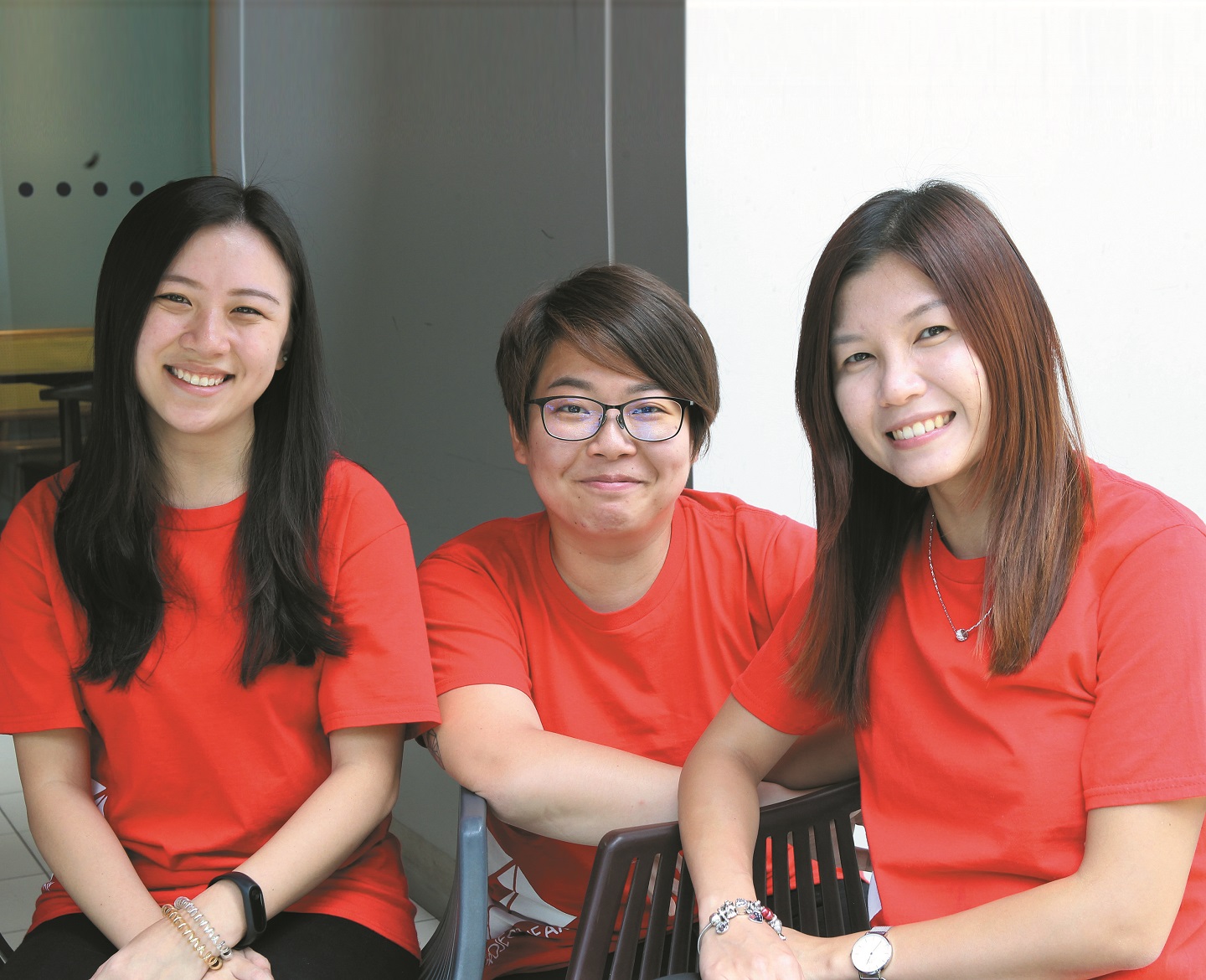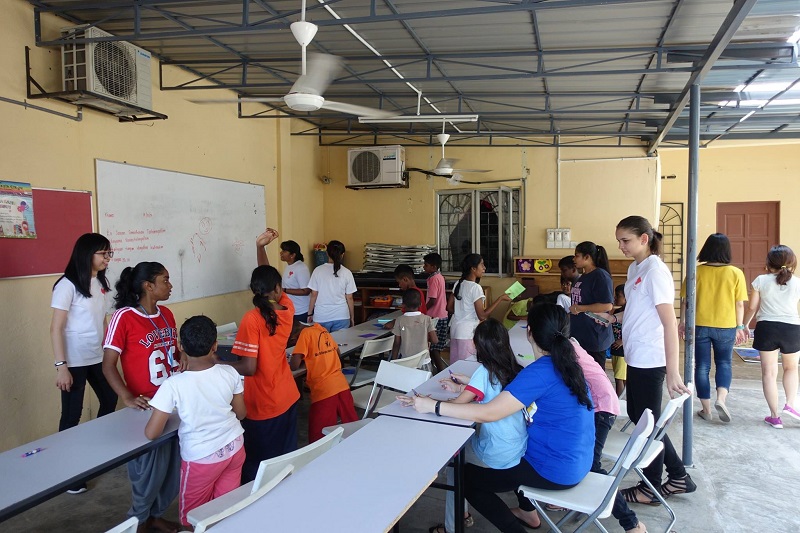
From left: Vice-president Phang Jo Yee, founder Lim Mei Wei and one of the organisation’s PR officers, Rachel Liow (Photo: Kenny Yap/The Edge)
Somewhere around December 2016, Lim Mei Wei, who is now the president of Project Heart, decided to celebrate Christmas by giving back to the community. So, she gathered family and friends to spend some time with the children at two orphanages. But at the end of the day, something did not feel right. Lim found herself questioning the purpose of such visits. “It was almost as if the children were compelled to put up a puppet show for us. There were multiple groups visiting them on the same day so it was just one group after another and there was no long-term relationship or bond formed,” she explains.
What she and her team witnessed during those visits led to the birth of Project Heart soon after, fuelled by sheer determination to build a more meaningful connection. The main idea was to empower children living in shelter homes.
Lim, together with vice-president Phang Jo Yee as well as one of the organisation’s PR officers, Rachel Liow, share their experience of running the organisation.
Utilising the expertise of the nine committee members in various fields, the organisation aims to better equip children for their future through education, economic empowerment, community participation, life-skills training and global connections. While the mission statement uses the term “orphans”, shortly after the inception of Project Heart, it became apparent to its founding members that not all children living in shelter homes fall within this category. Some come from broken families or single-parent homes but Lim says this does not change their mission in any way as many of the children are still lost and in need of guidance.
“Our key project is orphan development, whereby we undertake long-term engagement with an orphanage for at least five or six months,” Lim explains. This entails weekly classes during which Project Heart members attempt to discover each child’s potential, be it academic or vocational.

“Not all the children might excel in their studies and we can arrange tuition classes for those who need more guidance,” Lim says. Project Heart has currently hired two tutors for the shelter home, using funds from generous sponsors. Tables and chairs were purchased as well, so the children can study comfortably, instead of having to sit on the floor and do their work as they had to before.
According to Lim, some children may show interest in skills such as sewing. “If that is the case, we can get someone to teach them and from there, other children may develop a similar interest as well.”
Eventually, the organisation would like to set up a marketplace for the children to showcase their skills. “If they see that the public will buy their products, it will give them the confidence to do better,” says a pragmatic Lim, who, while eager to help the children, also wants to first gauge their interest and seriousness about pursuing a particular skill.
During Chinese New Year, Project Heart partnered comic blogger Ms Bulat, creative platform Black Milk Project and graphic designer Phang Zien Yee to create beautiful greeting cards, together with the children, which were later sold. The proceeds were used to fund renovations for the home.
One of the things Project Heart discovered very early on was that some children have fallen behind in school and their level of understanding of a subject may not be comparable to an average student of a similar age. Unlike the typical formal setting in schools, classes run by Project Heart volunteers emphasise practicality and application, with a focus on English and basic mathematics and calculations. “I do not expect them to be the best students in class but to adapt to daily life,” Lim says. More often than not, children who live sheltered lives in welfare homes may have trouble adapting when they are old enough to leave, and Project Heart wishes to change this.
Stressing the importance of building confidence and self-esteem, Phang says the organisation tries to lead through example and their interaction with each other. Having grown up with the support of family members, Lim finds it disheartening that children living in welfare homes do not have this privilege. “We wanted to fill that gap for them. Rather than go there and just have fun [for a few hours], we want them to know the other options they have [for their future].”
They have seen an improvement over time and nurtured a relationship of trust with the children, who can tell when one of the volunteers is not around that week. The team stresses that such progress is made possible through consistency and commitment. These two aspects, which are at the pinnacle of the organisation’s values, also pose a challenge as long-term volunteers are difficult to come by.

Even the caretakers and children were sceptical about the longevity of the project at its start, which was not surprising considering the many short-term activities initiated by other groups who have tried to help as well. But the team has proven them wrong by continuing to turn up. On the children’s part, an equal measure of seriousness, discipline and commitment is needed in order to make progress. Meanwhile, cooperation from the caretakers helps to ensure the continuity of lessons in punctuality and discipline.
Determined to keep the effort going, education and awareness form part of what Project Heart does. Phang tells us that “the learning curve has been steep for both them and members of the public [or sponsors] in learning what these homes truly need.”
“They (donors or sponsors) always think that food is the main need, in terms of education, stationery. But some shelter homes have a surplus of these items! It defeats the purpose to give a lot of these schooling items when there is no one there to teach them,” adds Liow, who is quick to add that it is not her intention to belittle such contributions as tangible items are necessary too. What she wishes to highlight and ask for is deeper involvement and a better understanding of the children’s needs.
Last March, the team made things official by registering the organisation. Phang says this move was also to engage a new audience beyond the people who know the team personally. “Our work with any particular home can never be completely done. If anything, it might mean less engagement,” says Lim. Phase 2 of its pilot project at Ephrata Home started in late February. The volunteers, who are ardent believers in quality over quantity, hope to replicate their work in other homes soon.
Lim celebrates the little victories along the way, knowing full well the hard work that has gone into achieving them. One she recalls fondly is the children getting all the answers correct in a recent spelling test.
“I know I cannot help everybody but if we can help even one child to be better, this world would be better than before,” she says.
For more information on how you can contribute to this cause or if you would like to partner with Project Heart, click here.


